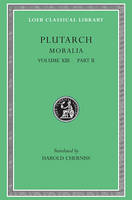
Moralia, Volume XIII
Part II: Stoic Essays
Seiten
1976
Harvard University Press (Verlag)
978-0-674-99517-8 (ISBN)
Harvard University Press (Verlag)
978-0-674-99517-8 (ISBN)
Plutarch (ca. AD 45–120) wrote on many subjects. His extant works other than the Parallel Lives are varied, about sixty in number, and known as the Moralia (Moral Essays). They reflect his philosophy about living a good life, and provide a treasury of information concerning Greco-Roman society, traditions, ideals, ethics, and religion.
Eclectic essays on ethics, education, and much else besides.
Plutarch (Plutarchus), ca. AD 45–120, was born at Chaeronea in Boeotia in central Greece, studied philosophy at Athens, and, after coming to Rome as a teacher in philosophy, was given consular rank by the emperor Trajan and a procuratorship in Greece by Hadrian. He was married and the father of one daughter and four sons. He appears as a man of kindly character and independent thought, studious and learned.
Plutarch wrote on many subjects. Most popular have always been the forty-six Parallel Lives, biographies planned to be ethical examples in pairs (in each pair, one Greek figure and one similar Roman), though the last four lives are single. All are invaluable sources of our knowledge of the lives and characters of Greek and Roman statesmen, soldiers and orators. Plutarch’s many other varied extant works, about sixty in number, are known as Moralia or Moral Essays. They are of high literary value, besides being of great use to people interested in philosophy, ethics, and religion.
The Loeb Classical Library edition of the Moralia is in fifteen volumes, volume XIII having two parts. Volume XVI is a comprehensive Index.
Eclectic essays on ethics, education, and much else besides.
Plutarch (Plutarchus), ca. AD 45–120, was born at Chaeronea in Boeotia in central Greece, studied philosophy at Athens, and, after coming to Rome as a teacher in philosophy, was given consular rank by the emperor Trajan and a procuratorship in Greece by Hadrian. He was married and the father of one daughter and four sons. He appears as a man of kindly character and independent thought, studious and learned.
Plutarch wrote on many subjects. Most popular have always been the forty-six Parallel Lives, biographies planned to be ethical examples in pairs (in each pair, one Greek figure and one similar Roman), though the last four lives are single. All are invaluable sources of our knowledge of the lives and characters of Greek and Roman statesmen, soldiers and orators. Plutarch’s many other varied extant works, about sixty in number, are known as Moralia or Moral Essays. They are of high literary value, besides being of great use to people interested in philosophy, ethics, and religion.
The Loeb Classical Library edition of the Moralia is in fifteen volumes, volume XIII having two parts. Volume XVI is a comprehensive Index.
Harold Fredrick Cherniss (1904–1987) was Professor of Greek at the University of California, Berkeley.
| Erscheint lt. Verlag | 1.7.1989 |
|---|---|
| Reihe/Serie | Loeb Classical Library |
| Übersetzer | Harold Cherniss |
| Zusatzinfo | Index |
| Verlagsort | Cambridge, Mass |
| Sprache | englisch |
| Maße | 108 x 162 mm |
| Gewicht | 386 g |
| Themenwelt | Literatur ► Essays / Feuilleton |
| Geisteswissenschaften ► Philosophie ► Philosophie Altertum / Antike | |
| ISBN-10 | 0-674-99517-1 / 0674995171 |
| ISBN-13 | 978-0-674-99517-8 / 9780674995178 |
| Zustand | Neuware |
| Informationen gemäß Produktsicherheitsverordnung (GPSR) | |
| Haben Sie eine Frage zum Produkt? |
Mehr entdecken
aus dem Bereich
aus dem Bereich
Schulbuch Klassen 7/8 (G9)
Buch | Hardcover (2015)
Klett (Verlag)
31,50 €
Buch | Softcover (2004)
Cornelsen Verlag
25,99 €


